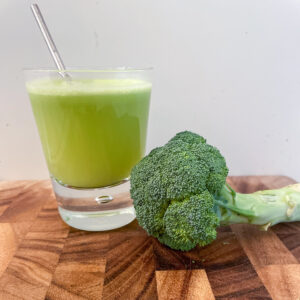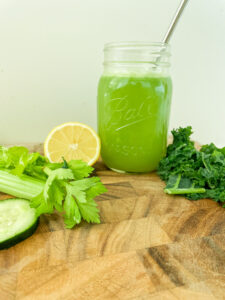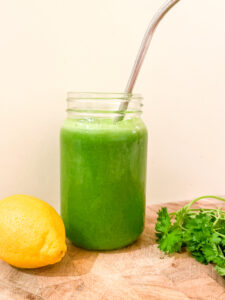Juicing Kiwi Benefits | Healthy Kiwifruit Juice Recipe

Juicing kiwi benefits are extensive and impressive! In the realm of nutrition, few fruits rival the natural goodness of kiwi in terms of both flavor and health benefits. Kiwi is renowned for its exceptional nutrient profile, making it a great addition to fruit salads, smoothies, and desserts. However, there's a lesser-known way to harness the potent goodness of kiwi: juicing.
Discover the various kiwi juicing benefits and find my simple yet delicious kiwi vegetable juice recipe that will revitalize your body from the inside out. From immune-boosting vitamins C, K and E to digestion-enhancing fiber, kiwi juice is a great way to nourish the body.
Jump to Recipe- Nutritional Value of Kiwi: What Vitamins and Minerals are in Kiwi?
- Juicing Kiwi Benefits: What are the heath benefits of kiwi juice?
- What are the different types of kiwi? Does one variety of kiwi contain extra nutrients?
- Can you eat kiwi skin? Are there health benefits to eating kiwi skin?
- What happens if you eat kiwi everyday?
- Juicing Kiwi Benefits: Does kiwi juice detox your body?
- Juicing Kiwi Benefits: Is kiwi juice good for your hair and nails?
- Juicing Kiwi Benefits: Is kiwi juice good for your liver?
- Kiwi Juicing Benefits: Are there any side effects to consuming kiwi juice?
- Can pregnant women consume kiwi juice?
- Why You'll Love this Fresh Kiwi Juice Recipe
- Juicing Kiwi Benefits: Kiwi Vegetable Juice Recipe Ingredients (and their Health Benefits)
- How to Make Kiwi Juice in a Juicer
- How to Make Kiwi Juice in a Blender
- Other Suggested Vegetables to Add to Kiwi Vegetable Juice Recipe
- How to Store Kiwi Juice
- Kiwi Vegetable Juice
- More Fresh Juice Recipes from Each Healthy Bite
Nutritional Value of Kiwi: What Vitamins and Minerals are in Kiwi?
Kiwi is a nutrient-dense fruit that provides a range of vitamins and minerals. Here's a breakdown of some key nutrients found in kiwi:
Vitamin C
Kiwi is renowned for its high vitamin C content. One medium-sized kiwi (about 69 grams) can provide over 70% of the recommended daily intake of vitamin C for adults.
Vitamin C, or ascorbic acid, is a vital nutrient renowned for its multifaceted health benefits. As a powerful antioxidant, vitamin C helps combat oxidative stress by neutralizing harmful free radicals, thereby reducing the risk of chronic diseases like heart disease, cancer, and neurodegenerative disorders. Moreover, this nutrient plays a pivotal role in bolstering immune function, supporting the production and function of white blood cells essential for fighting infections. Regular consumption of vitamin C-rich foods can help alleviate the severity and duration of colds and respiratory infections, promoting overall wellness.
Beyond immune support, vitamin C contributes to skin health by facilitating collagen synthesis, a process crucial for wound healing, skin elasticity, and tissue repair. By promoting collagen production, vitamin C helps maintain a youthful complexion and enhances skin resilience. Furthermore, vitamin C aids in the absorption of non-heme iron from plant-based foods, mitigating the risk of iron deficiency anemia and promoting healthy red blood cell formation.
Additionally, vitamin C exhibits cardiovascular benefits by lowering high blood pressure, reducing LDL cholesterol levels, and improving endothelial function. Its antioxidant properties safeguard against oxidative damage to blood vessels, reducing the risk of heart disease. Moreover, vitamin C supports eye health by protecting against age-related macular degeneration and cataracts, preserving vision and ocular integrity.
Vitamin K
Kiwi contains vitamin K, which plays a crucial role in blood clotting and bone health. A single kiwi can provide around 30% of the daily recommended intake of vitamin K. Vitamin K, a fat-soluble vitamin, plays a vital role in blood clotting, bone health, and cardiovascular function. It facilitates the synthesis of proteins necessary for blood coagulation, preventing excessive bleeding in response to injury. Additionally, vitamin K contributes to bone mineralization by activating osteocalcin, a protein essential for calcium binding in bones. Emerging research suggests that adequate intake of vitamin K may also protect against arterial calcification and help to prevent again cardiovascular disease.
Vitamin E, Folate, Potassium, Fiber, and Others
Vitamin E: Kiwi contains small amounts of vitamin E. The antioxidant properties of vitamin e protect cells from oxidative damage.
Folate: Folate, also known as vitamin B9, is important for DNA synthesis and cell division. Kiwi provides a moderate amount of folate, contributing to overall health and wellbeing.
Potassium: Kiwi is a good source of potassium, an electrolyte that helps regulate fluid balance, muscle contractions, and nerve signals. Potassium is essential for heart health and maintaining healthy blood pressure levels.
Fiber: Kiwi is rich in dietary fiber, which supports digestive health, promotes satiety, and helps regulate blood sugar levels.
Other nutrients: Kiwi also contains smaller amounts of other vitamins and minerals, including vitamin A, vitamin B6, calcium, magnesium, and iron.
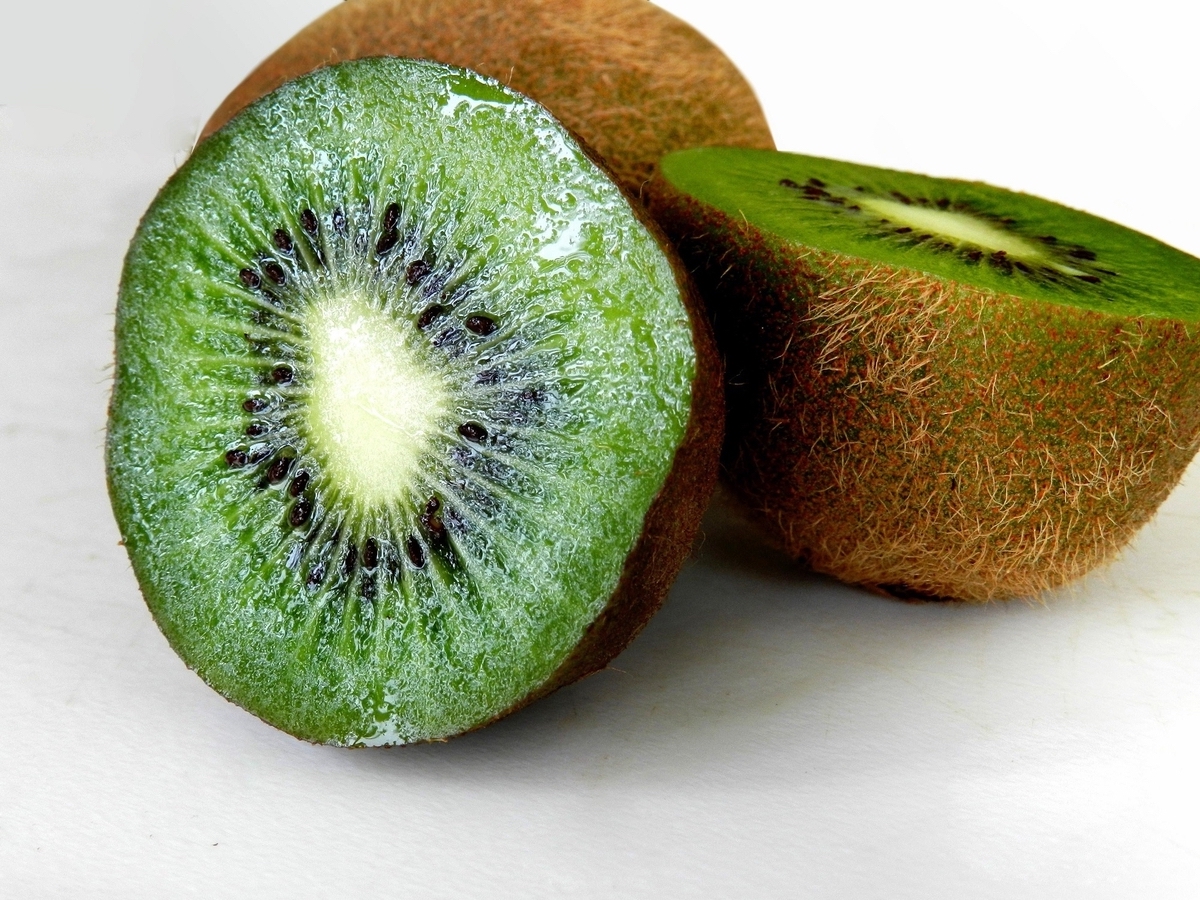
Juicing Kiwi Benefits: What are the heath benefits of kiwi juice?
Juicing kiwi benefits health due to its nutrient-rich composition. Here are some of the key health benefits of consuming a glass of kiwi juice:
- High in Vitamin C: Kiwi juice is renowned for its high vitamin C content, which supports immune health, helps protect against infections, and promotes skin health. Vitamin C is also a powerful antioxidant that helps combat oxidative stress and inflammation in the body. Vitamin C has also been shown to support heart health and lower blood pressure.
- Rich in Antioxidants: Kiwi juice contains various antioxidants, including vitamin C, vitamin E, and polyphenols, which help neutralize harmful free radicals in the body. Antioxidants play a crucial role in disease prevention, such as lower risks of cardiovascular problems, lower risk of cancer, and lower risk of neurodegenerative disorders.
- Supports Digestive Health: Kiwi juice is a good source of dietary fiber, which promotes digestive health by regulating bowel movements, preventing constipation, and supporting the growth of beneficial gut bacteria. Fiber also helps maintain healthy blood sugar levels and cholesterol levels.
- Heart Health: The potassium content in kiwi juice helps regulate blood pressure and supports cardiovascular health. Potassium is an essential electrolyte that helps maintain proper fluid balance, muscle function, and nerve signaling in the body.
- Skin Health: The combination of vitamin C and antioxidants in kiwi juice supports collagen synthesis, which is essential for maintaining skin elasticity, hydration, and overall skin health. Regular consumption of kiwi juice may help reduce the appearance of wrinkles and promote a youthful complexion.
- Hydration: Kiwi juice is primarily composed of water, making it a hydrating beverage choice. Staying hydrated is essential for overall health and well-being, as water supports various bodily functions, including temperature regulation, nutrient transport, and waste elimination.
- Weight Management: Incorporating kiwi juice into a balanced diet may support weight management efforts due to its low calorie and high fiber content. Fiber-rich foods like kiwi juice help promote feelings of fullness and satiety, reducing overall calorie intake and supporting weight loss or maintenance goals.
- Eye Health: Kiwi juice contains lutein and zeaxanthin, two antioxidants that are beneficial for eye health. These compounds help protect the eyes from oxidative damage, reduce the risk of age-related macular degeneration, and promote overall visual acuity.
Overall, including kiwi juicing benefits in a number of impressive ways, but it's essential to consume it in moderation as part of a balanced lifestyle. As with any dietary change, individuals with specific health conditions or concerns should consult with a healthcare professional or registered dietitian for personalized advice.
What are the different types of kiwi? Does one variety of kiwi contain extra nutrients?
There are several different types of kiwi fruit, each with its own unique characteristics and flavors. The two most common types of kiwi fruit are the fuzzy green kiwi (Actinidia deliciosa) and the golden kiwi (Actinidia chinensis). Additionally, there are various cultivars and hybrids within these two main types. Here's an overview of each:
- Fuzzy Kiwi (Actinidia deliciosa):
- This is the most widely recognized variety of kiwi, known for its brown, fuzzy skin and vibrant green flesh speckled with tiny black seeds.
- The most common cultivar of fuzzy kiwi is the Hayward kiwi, which is the variety typically found in grocery stores worldwide.
- Fuzzy kiwi has a sweet-tart flavor and a slightly tangy taste, making it a popular choice for eating fresh or adding to fruit salads, desserts, and smoothies.
- Golden Kiwis (Actinidia chinensis):
- Also known as yellow kiwis or kiwifruit, the golden kiwi features a smooth, bronze-colored skin and golden-yellow flesh.
- Golden kiwi tends to be sweeter and less tart than fuzzy kiwi, with a tropical flavor reminiscent of pineapple or mango.
- This variety is often favored for its milder taste and softer texture, making it a delightful snack on its own or a versatile ingredient in recipes.
In terms of nutritional content, both fuzzy kiwi and golden kiwi are rich in essential vitamins, minerals, and antioxidants, including vitamin C, vitamin K, vitamin E, potassium, and dietary fiber. However, there may be slight differences in nutrient levels and antioxidant profiles between the two varieties.
While both types of kiwi offer impressive health benefits, individual preferences for taste, texture, and appearance may influence which variety you prefer.
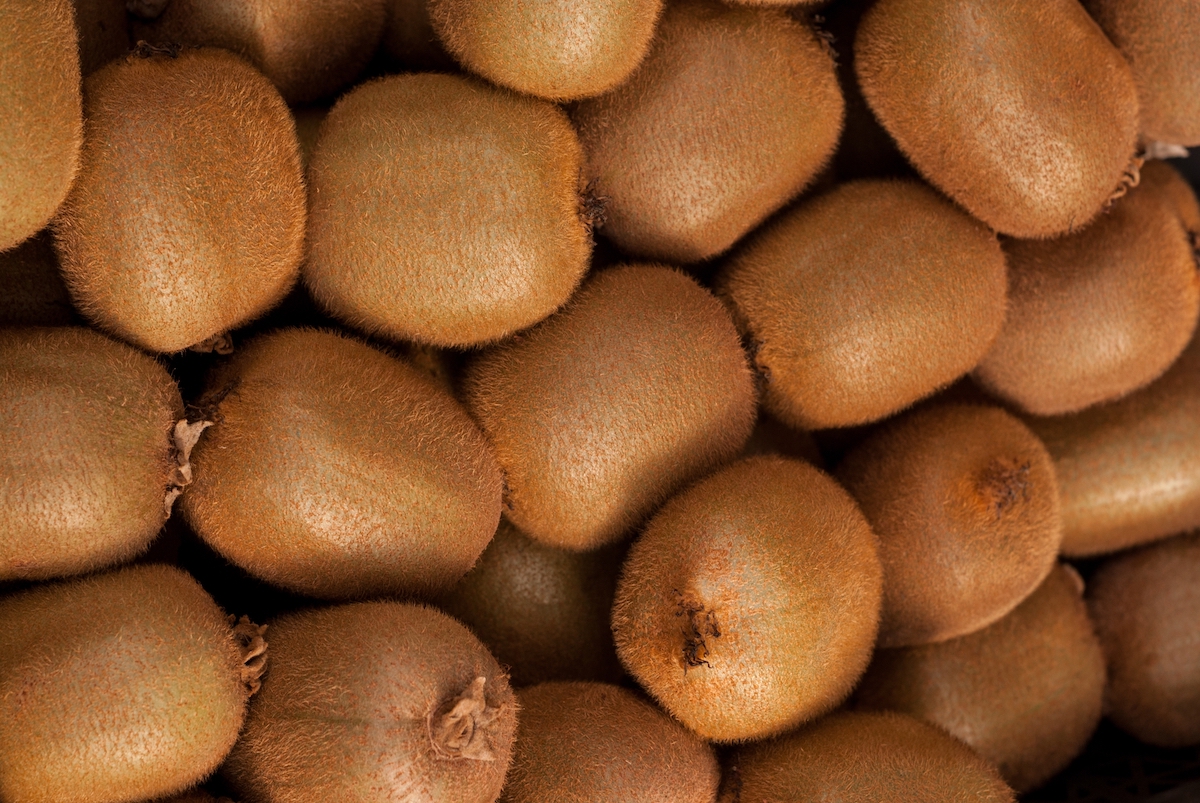
Can you eat kiwi skin? Are there health benefits to eating kiwi skin?
Yes, you can eat kiwi skin, and doing so provides additional nutritional benefits. The fuzzy outer skin of kiwi is edible and contains a variety of nutrients, including fiber, vitamins, and antioxidants. Here are some potential health benefits of eating kiwi skin:
- Dietary Fiber: Kiwi skin is rich in dietary fiber, particularly insoluble fiber, which plays an important role in digestive health by promoting regular bowel movements and preventing constipation. Fiber also helps regulate blood sugar levels and may contribute to weight management by promoting feelings of fullness.
- Antioxidants: The skin of kiwi contains a concentrated amount of antioxidants, including vitamin C and polyphenols, which help neutralize harmful free radicals in the body. Antioxidants have anti-inflammatory effects, protecting cells from damage, and lowering the risk of chronic diseases such as heart disease and cancer.
- Vitamins and Minerals: Kiwi skin contains various vitamins and minerals, including vitamin E, vitamin K, folate, and potassium, which contribute to overall health and well-being. These nutrients support immune function, bone health, blood clotting, and electrolyte balance.
- Prebiotic Potential: The fiber in kiwi skin may act as a prebiotic, feeding beneficial gut bacteria and promoting a healthy gut microbiome. A balanced and diverse gut microbiota is associated with improved digestion, immune function, and mood regulation.
However, it's essential to note that some people may find the texture or taste of kiwi skin unappealing. Additionally, individuals with oral allergies or sensitivities may experience itching or discomfort when consuming kiwi skin. If you choose to eat kiwi skin, thoroughly wash the fruit to remove any dirt, pesticides, or contaminants. Consider purchasing organic kiwi whenever possible to minimize exposure to pesticides. Ultimately, whether you eat kiwi skin or not is a matter of personal preference, but doing so can provide additional health benefits and contribute to a more sustainable approach to eating.
What happens if you eat kiwi everyday?
Eating kiwi every day can offer a range of health benefits due to its nutrient-rich profile. However, there are a few considerations to keep in mind:
- High Vitamin C Intake: Kiwi is exceptionally high in vitamin C, which is generally beneficial for immune function, skin health, and wound healing. However, consuming very large amounts of vitamin C from kiwi (or any source) can sometimes lead to digestive discomfort, such as diarrhea or stomach upset, particularly if you're not used to consuming high levels of vitamin C.
- Oral Allergy Syndrome (OAS): Some individuals may experience oral allergy syndrome (OAS) after consuming kiwi. OAS is a type of food allergy that occurs when the body's immune system reacts to proteins in certain fruits and vegetables. Symptoms may include itching or tingling in the mouth, throat, or lips. If you have a known allergy to kiwi or latex, it's important to avoid consuming kiwi or speak with a healthcare professional before adding it to your daily diet.
- Digestive Health: The fiber content in kiwi can support digestive health by promoting regular bowel movements and supporting the growth of beneficial gut bacteria. However, consuming large amounts of kiwi may cause digestive discomfort in some individuals, especially if they have a sensitivity to dietary fiber or fructose.
- Nutrient Benefits: Eating kiwi regularly can provide a range of nutrients, including vitamin C, vitamin K, potassium, and fiber, which can support overall health and wellbeing. These nutrients contribute to immune function, heart health, bone health, and digestive health.
Overall, incorporating kiwi into your daily diet can be a healthy choice for most people, but it's essential to listen to your body and monitor for any adverse reactions. If you have concerns about adding kiwi to your diet, consult with a healthcare professional for personalized advice.
Juicing Kiwi Benefits: Does kiwi juice detox your body?
There is no scientific evidence to support the claim that kiwi juice specifically detoxifies the body. While kiwi juice, like many fruits and vegetables, contains antioxidants, vitamins, and minerals that support overall health and well-being, the concept of "detoxing" the body is not well-defined or scientifically validated.
The body has its own natural detoxification mechanisms primarily carried out by the liver, kidneys, and digestive system. These organs work together to filter and eliminate toxins and waste products from the body.
Consuming a balanced diet that includes a variety of whole foods like fruits, vegetables, whole grains, lean proteins, and healthy fats, along with staying hydrated and being physically active, supports the body's natural detoxification processes. However, there is no single food or beverage, including kiwi juice, that can "detox" the body on its own.
While kiwi juice can be a nutritious addition to a healthy diet, it's essential to approach claims of detoxification with skepticism and focus on overall lifestyle habits that support long-term health and well-being. If you have specific health concerns or are considering making significant changes to your diet, it's a good idea to consult with a healthcare professional for personalized advice.
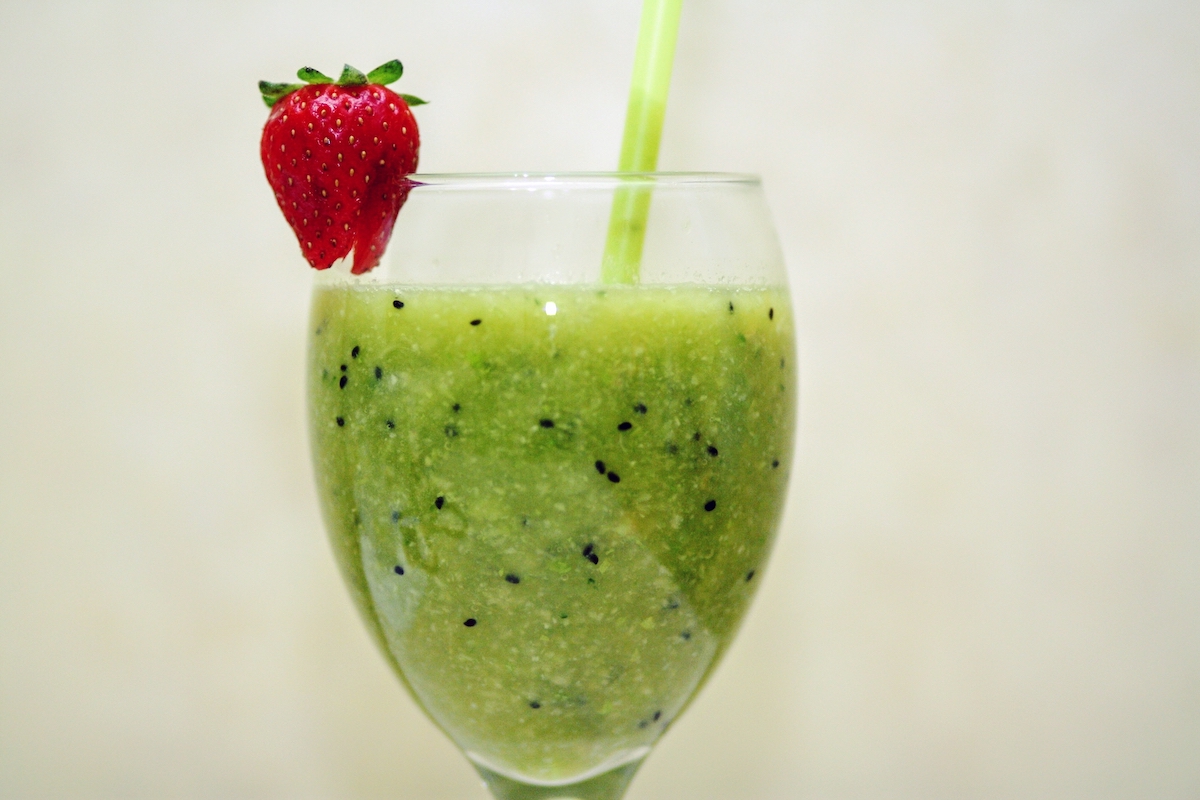
Juicing Kiwi Benefits: Is kiwi juice good for your hair and nails?
Juicing kiwi benefits the health of your hair and nails due to its rich profile of essential nutrients, particularly its high content of vitamin C and other vitamins and minerals. Kiwi juice may benefit your hair and nails in the following ways:
- Vitamin C: Kiwi is renowned for its high vitamin C content, which is essential for collagen synthesis. Collagen is a protein that provides structure and strength to hair and nails. Adequate vitamin C intake promotes collagen production, helping to maintain the integrity and health of hair follicles and nail beds.
- Antioxidants: Kiwi contains various antioxidants, including vitamin C, vitamin E, and polyphenols, which help protect cells from oxidative stress and damage. Oxidative stress can contribute to hair and nail problems, such as dullness, brittleness, and breakage. Antioxidants in kiwi juice may help counteract oxidative damage and support the health of hair and nails.
- Biotin: Kiwi contains small amounts of biotin, also known as vitamin B7 or vitamin H. Biotin is essential for the metabolism of amino acids and fatty acids, which are important building blocks for healthy hair and nails. While kiwi is not a particularly high source of biotin compared to some other foods, every little bit helps contribute to overall biotin intake.
- Hydration: Staying hydrated is crucial for maintaining the health of your hair and nails. Kiwi juice, like other fruit juices, contributes to overall hydration. Proper hydration supports the transport of nutrients to hair follicles and nail beds, promoting their health and vitality.
Juicing Kiwi Benefits: Is kiwi juice good for your liver?
Kiwi juice, like whole kiwi fruit, contains vital nutrients and antioxidants that may support liver health indirectly as part of a balanced diet and healthy lifestyle. Here's how kiwi juice may contribute to liver health:
- Antioxidants: Kiwi is rich in antioxidants, including plenty of vitamin C, vitamin E, and polyphenols, which help protect liver cells from oxidative damage caused by free radicals. Oxidative stress can lead to inflammation and damage to liver tissue, so consuming antioxidant-rich foods like kiwi may help reduce the risk of liver damage.
- Vitamin C: The high vitamin C content in kiwi juice supports the body's natural detoxification processes. Vitamin C plays a crucial role in the synthesis of glutathione, a powerful antioxidant produced by the liver that helps detoxify harmful substances and protect liver cells from damage.
- Hydration: Staying hydrated is important for liver health, as adequate hydration supports optimal liver function. Drinking kiwi juice, which is primarily composed of water, can contribute to overall hydration and support liver function.
- Fiber: While kiwi juice lacks the fiber content of whole kiwi fruit, it still contains some dietary fiber. Fiber helps regulate digestion and promotes the elimination of waste products from the body, including toxins and cholesterol. A healthy digestive system can indirectly benefit liver health by reducing the burden on the liver to process toxins.
While juicing kiwi benefits your diet and may support liver health as part of a balanced lifestyle, it's essential to consume it in moderation and as part of a diverse diet rich in fruits, vegetables, whole grains, lean proteins, and healthy fats. If you have specific concerns about your liver health or underlying liver conditions, it's essential to consult with a healthcare professional for personalized advice and management.
Kiwi Juicing Benefits: Are there any side effects to consuming kiwi juice?
While kiwi juice is generally safe for most people when consumed in moderation, some individuals may experience side effects or allergic reactions. Here are some potential considerations:
- Oral Allergy Syndrome (OAS): Kiwi allergies are not uncommon, particularly among individuals with pollen allergies or latex allergies. Oral Allergy Syndrome (OAS) can occur when the body's immune system reacts to proteins in kiwi, leading to symptoms such as itching, tingling, or swelling in the mouth, lips, throat, or tongue. If you have known allergies to kiwi, pollen, or latex, it's essential to avoid kiwi juice and other kiwi products to prevent an allergic reaction.
- Digestive Upset: Some individuals may experience digestive discomfort, such as bloating, gas, or diarrhea, after consuming kiwi juice, particularly if they have a sensitivity to certain compounds found in kiwi or other fruits. This may be due to the high fiber content in kiwi, which can sometimes be difficult to digest for some people.
- Acidic Sensitivity: Kiwi juice is acidic due to its high vitamin C content, which may irritate the stomach lining or exacerbate symptoms of acid reflux or gastroesophageal reflux disease (GERD) in some individuals. If you have a history of acid-related digestive issues, you may want to consume kiwi juice in moderation or consult with a healthcare professional before adding it to your diet.
- Interactions with Medications: Kiwi juice contains compounds that may interact with certain medications. For example, kiwi contains vitamin K, which can interfere with blood-thinning medications like warfarin (Coumadin). If you're taking any medications, particularly blood thinners or other prescription drugs, it's essential to consult with a healthcare professional before consuming kiwi juice regularly to avoid potential interactions.
- Allergic Reactions: In rare cases, some individuals may experience allergic reactions to kiwi juice, including hives, rash, difficulty breathing, or anaphylaxis. If you experience any severe or concerning symptoms after consuming kiwi juice, seek medical attention immediately.
Overall, kiwi juice can be a nutritious addition to a balanced diet for most people, but it's essential to be aware of potential side effects and consume it in moderation, especially if you have known allergies, digestive sensitivities, or underlying health conditions. If you have any concerns or experience adverse reactions after consuming kiwi juice, consult with a healthcare professional for personalized advice.
Can pregnant women consume kiwi juice?
In general, kiwi juice is considered safe for pregnant women when consumed in moderation as part of a balanced diet. Juicing kiwi benefits can be beneficial during pregnancy. Here are some points to consider:
- Nutritional Benefits: Kiwi is rich in vitamin C, vitamin K, folate, potassium, and dietary fiber, all of which are important nutrients for a healthy pregnancy. Vitamin C, in particular, supports the immune system and helps with the absorption of iron from plant-based foods.
- Hydration: Staying hydrated is important during pregnancy to support overall health and well-being. Kiwi juice, like other fruit juices, can contribute to hydration, especially if water intake is insufficient.
- Fiber Content: Kiwi juice contains dietary fiber, which can help prevent constipation, a common issue during pregnancy. However, pregnant women should be mindful of consuming too much fiber, as excessive intake may lead to bloating or digestive discomfort.
- Heartburn and Acid Reflux: Some pregnant women may experience heartburn or acid reflux, especially during the later stages of pregnancy. Kiwi juice, with its acidic nature, may exacerbate these symptoms in some individuals. Pregnant women prone to acid reflux may want to consume kiwi juice in moderation or dilute it with water to reduce acidity.
- Allergies: If you have a known allergy to kiwi or other fruits, it's essential to avoid kiwi juice during pregnancy to prevent allergic reactions. Allergic reactions during pregnancy can be particularly concerning, so it's best to err on the side of caution.
- Food Safety: When consuming kiwi juice during pregnancy, ensure that the juice is fresh and prepared in sanitary conditions to reduce the risk of foodborne illness.
As with any dietary choice during pregnancy, it's crucial for pregnant women to consult with their healthcare provider or a registered dietitian before making significant changes to their diet, including the addition of kiwi juice. They can provide personalized guidance based on individual health status, nutritional needs, and any specific concerns or considerations during pregnancy.
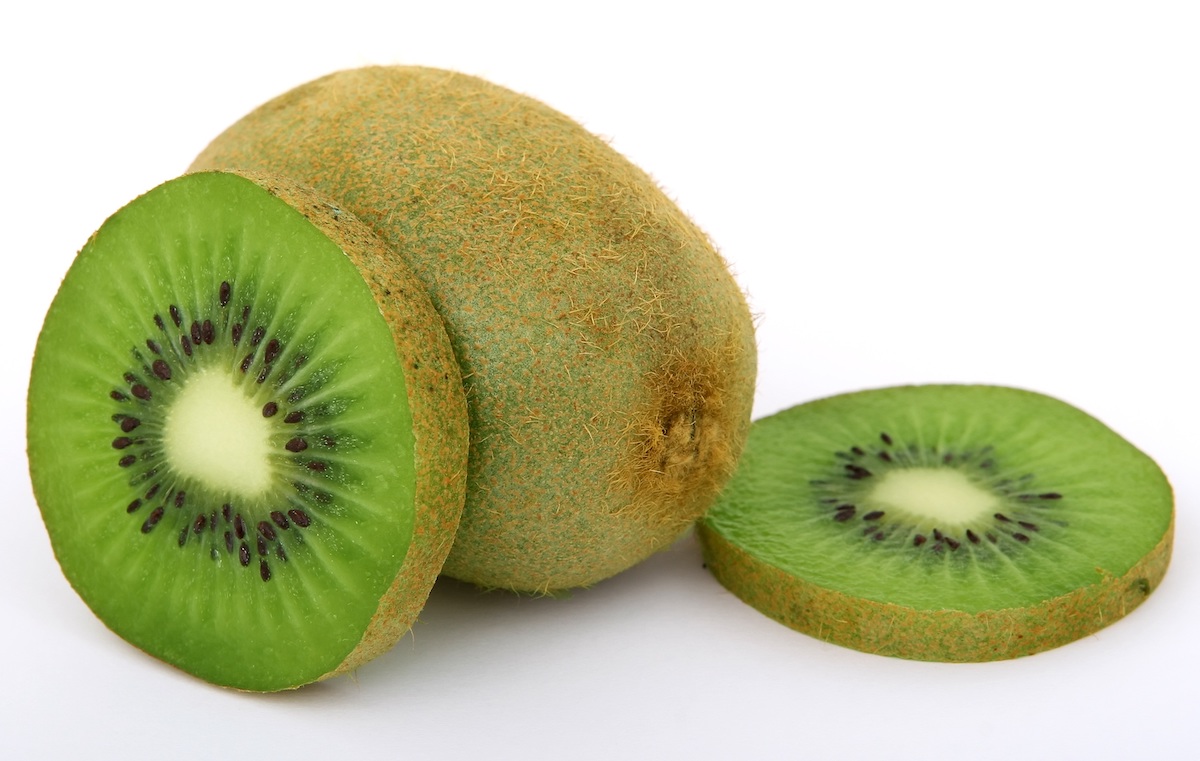
Why You'll Love this Fresh Kiwi Juice Recipe
This green juice with kiwis helps you get all of the kiwi juicing benefits and:
- is a sweet and delicious drink packed with vegetable juice and fruits.
- is a homemade juice that can be made in a blender or juicer.
- is versatile (see below for suggestions about other fruits and veggies to include in this super healthy recipe).
- is made with simple ingredients that are easily found at local grocery stores.
- does not taste like most veggie juices! It is a sweet like ripe kiwi.
Juicing Kiwi Benefits: Kiwi Vegetable Juice Recipe Ingredients (and their Health Benefits)
Here's a brief overview of the health benefits of each ingredient in the simple recipe for kiwifruit juice:
- See above for information about the health benefits of kiwi juice and fresh kiwi.
- Cucumber: Cucumber is hydrating and low in calories, making it a refreshing addition to the juice. It contains vitamins K and C, as well as antioxidants like flavonoids and tannins. Cucumber may promote hydration, skin health, and digestion.
- Celery: Celery is rich in vitamins A, K, and C, as well as minerals like potassium and folate. It contains antioxidants such as flavonoids and polyphenols, which have anti-inflammatory properties. Celery may support heart health, digestion, and hydration.
- Green Apple: Green apples are a good source of vitamin C, fiber, and antioxidants like quercetin and catechins. They may help regulate blood sugar levels, support digestion, and promote satiety.
- Lemon: Lemons are rich in vitamin C and flavonoids, which have antioxidant and anti-inflammatory properties. They may support immune function, digestion, and detoxification.
- Ginger: Ginger contains bioactive compounds like gingerol and shogaol, which have anti-inflammatory and antioxidant effects. It may help alleviate nausea, reduce muscle pain, and support digestive health.
- Spinach: Spinach is a nutrient-dense leafy green vegetable rich in vitamins A, C, and K, as well as folate, iron, and magnesium. It contains antioxidants like lutein and zeaxanthin, which support eye health and may reduce the risk of chronic diseases.
How to Make Kiwi Juice in a Juicer
- To make kiwi veggie fruit juice using a juicing machine, begin by thoroughly washing and preparing all the fruits and vegetables.
- Set up your juicer according to the manufacturer's instructions. See this article about selecting the right juicer for you!
- Run all of the ingredients through the juicer.
- If desired, add ice cubes to the fresh fruit juice to chill it and dilute the flavor slightly.
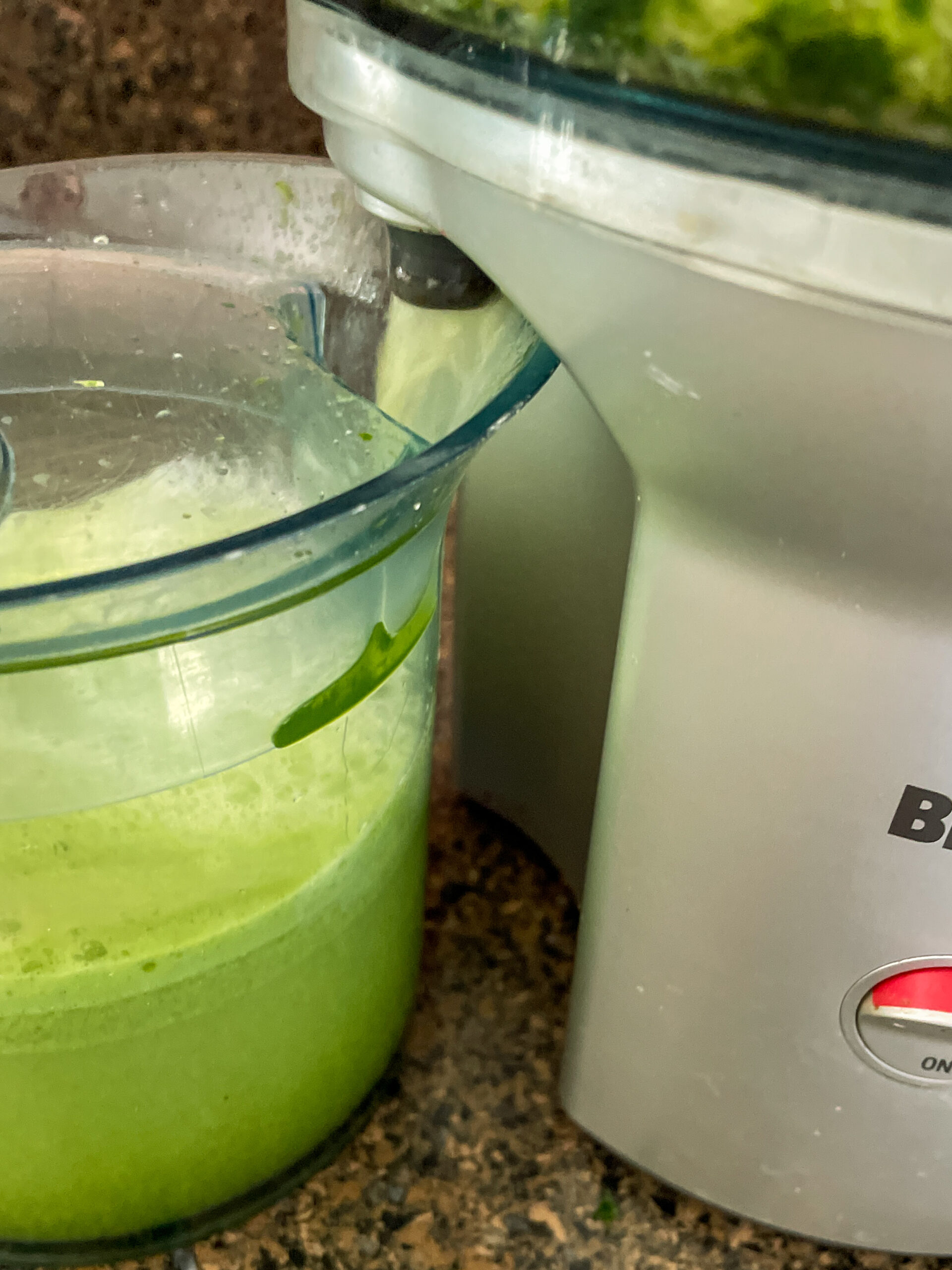
How to Make Kiwi Juice in a Blender
- To make the kiwi veggie fruit juice using a blender, start by thoroughly washing and preparing all the fruits and vegetables.
- Peel and chop the kiwis, cucumber, celery, green apple, lemon (peeled), and ginger.
- Place all the chopped ingredients into the blender along with a cup of spinach leaves. Add a splash of water or coconut water to help with blending, then blend on high speed until the mixture is smooth and well combined. You may need to stop and scrape down the sides of the blender occasionally to ensure all ingredients are evenly blended.
- Once the mixture is smooth, pour it through a fine-mesh strainer or nut milk bag into a large bowl or pitcher to remove any pulp and fiber. Press down on the pulp with a spoon or spatula to extract as much juice as possible.
- Transfer the strained juice back into the blender and blend again briefly to ensure it's well mixed.
- If desired, add ice cubes to the blender and blend again to chill the juice.
Other Suggested Vegetables to Add to Kiwi Vegetable Juice Recipe
Here are 11 other vegetables that could be added to the kiwi veggie fruit juice for additional flavor and nutrition:
- Carrots
- Beetroot
- Kale
- Spinach
- Parsley
- Bell peppers (red, yellow, or orange)
- Broccoli
- Zucchini
- Fennel
- Bok choy
- Romaine lettuce
These vegetables will add a variety of vitamins, minerals, and antioxidants to the juice, enhancing its health benefits and flavor profile. Feel free to experiment with different combinations to find your favorite blend!
How to Store Kiwi Juice
To store kiwi juice, it's best to keep it refrigerated in an airtight container in order to maintain the kiwi juicing benefits. Here's a step-by-step guide:
- Allow the kiwi juice to cool to room temperature before refrigerating it.
- Transfer the juice to a clean, airtight container with a tight-fitting lid.
- Seal the container securely to prevent any air from entering, as exposure to air can cause the juice to oxidize and degrade in quality.
- Label the container with the date of preparation to help you keep track of its freshness.
- Place the container of kiwi juice in the refrigerator, ideally on a shelf rather than in the door where temperatures can fluctuate more.
- Consume the juice within 2-3 days for optimal freshness and flavor.
- Before serving, give the juice a good shake or stir to recombine any separated solids or sediment.
By following these steps, you can store kiwi juice safely in the refrigerator and enjoy it over several days.
Freezing the juice is also a convenient option. See this article for information about how to properly freeze fresh juice.
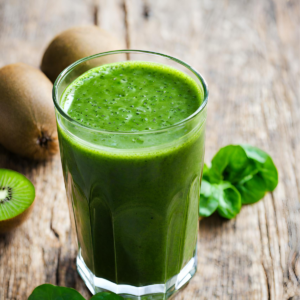
Kiwi Vegetable Juice
Equipment
- 1 high speed blender or juicer
Ingredients
- 4 ripe kiwis peeled
- 1 cucumber
- 2 celery stalks
- 1 green apple
- ½ lemon peeled
- 1 inch piece of fresh ginger
- 1 cup spinach leaves
- 1 cup ice cubes optional
Instructions
- To juice: peel the kiwis and the lemon and wash the remaining ingredients. Run through your juicer of choice and drink! Serve over ice if desired.To make with a blender see the steps below.
- Peel kiwi and lemon. Roughly chop the remaining ingredients and add to blender.
- Add a splash of water or coconut water to help blend the ingredients smoothly.
- Blend on high speed until the mixture is smooth and well combined. You may need to stop and scrape down the sides of the blender occasionally to ensure all ingredients are evenly blended.
- Once the mixture is smooth, pour it through a fine-mesh strainer or nut milk bag into a large bowl or pitcher to remove any pulp and fiber.
- Press down on the pulp with a spoon or spatula to extract as much juice as possible.
- Transfer the strained juice back into the blender and blend again briefly to ensure it's well mixed.
- If desired, add ice cubes to the blender and blend again to chill the juice.
- Pour the kiwi veggie fruit juice into glasses and serve immediately.
More Fresh Juice Recipes from Each Healthy Bite
